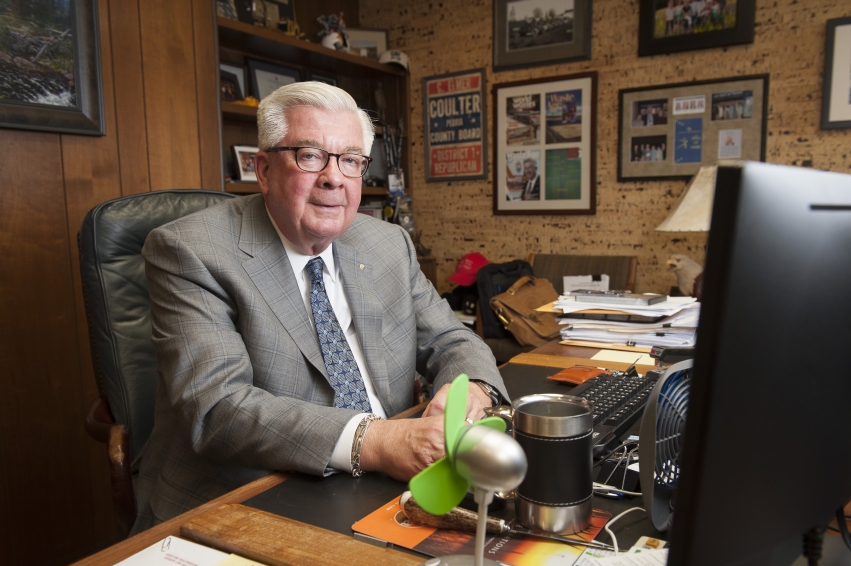
Photography by David Vernon
With a lifelong reputation as a tough businessman whose word is his bond, Royal J. Coulter has lived the American dream—carrying on the vision of his father and grandfather, while passing on the torch to his own three sons.
As president of Peoria Disposal Company (PDC), Coulter’s life’s work is, quite literally, part of his DNA. A proud, lifelong Peorian, he grew up in the family business, watching as the one-man garbage collection operation his grandfather founded in 1923 grew into a leading force in the community. He’s worn a lot of hats over the years: picking up garbage, driving and dispatching trucks, operating heavy equipment, supervising activities at the landfill, and getting involved with sales. Following his father’s untimely death, he became the third generation of Coulters to lead the company.
Since taking over as president, Coulter has grown PDC from a small family business into the largest family-owned environmental services company in the state of Illinois—and one of the 25 largest environmental services companies in North America. All the while, he has focused like a laser on diversifying the business and building its financial strength, even as it maintains the familiarity and entrepreneurial spirit of a close-knit, family-owned operation. His secret? Working hard, delivering superior customer service and taking care of his employees—while staying faithful to the bedrock principles on which the company was built: integrity, honesty and loyalty.
With plans to continue working as long as his health allows, Coulter is looking forward to the next decade, when PDC celebrates its centennial anniversary—and potentially witnessing a fifth generation carry forward the family legacy.
Tell me about your ancestry: your parents and grandparents, where they came from, and what led them to Peoria.
My father’s parents were John and Ethel Coulter. John was a security guard at a factory in Peoria. When the factory announced it was closing in 1928, John decided to strike out on his own and started a garbage collection company. He founded Peoria Disposal Company (PDC) in West Peoria with one truck. He knocked on doors of households and businesses asking if he could haul away their trash.
At home, John and Ethel had four sons and four daughters. Three of the sons decided to follow John into the garbage business: Elmer, Reuben and Melvin. Elmer was my dad. He and my uncles expanded PDC’s residential and commercial customer count.
My mother’s parents were Royal and Nellie Zerwekh. Royal was in the grocery business: R.J. Zerwekh Grocery Store on Peoria’s south side. Nellie was a homemaker. Their daughter, Dorothy, married my dad, and I was born in 1947. My father borrowed $5,000 from his in-laws in the early 1950s and used the loan to buy a modern garbage truck. That family loan allowed PDC to grow and continue building a customer base.
Tell me about your childhood in Peoria. What were your hobbies and interests?
Sports were a big part of growing up in Peoria. When I was a student at Roosevelt Junior High School, I played biddy-basketball with the late Paul Rutherford. I also played basketball with Al Smith at Roosevelt. Al went on to play at Bradley University and then professionally.
When I wasn’t on the basketball court or baseball diamond, I was working for my dad at the PDC waste hauling operation on Swords Avenue. My job was to do what I was told. I loved being with my dad at work. My mother made me keep up on my school work and stay out of trouble. If I didn’t follow her rules at home, there was no going to work on the weekend with my father.
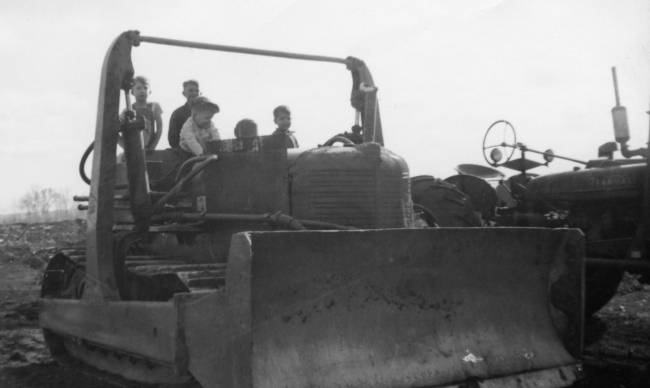
Royal as a youngster, at far left
Outside of the family business, who were your biggest influences?
Of course, my parents were always supportive. Many Peoria coaches and teachers also had a major influence on my life. My mentors were Swen Wallin, Bruce Boyle, Harry and Dick Whitaker, William “Corky” Robertson and Phil Salzer. They were all influential adults when I was a kid.
Tell me about your early schooling and military service.
I attended Calvin Coolidge Grade School, Roosevelt Junior High and Peoria Central High School. I graduated from Central in 1965. I played both varsity basketball and baseball at Central.
The U.S. Army drafted me in 1967. Basic training started at Fort Polk in Louisiana. There was advanced training at Fort Sam Houston in San Antonio, Texas. In 1968 and ’69, I was stationed at Ft. Hamilton in Brooklyn, New York. I also spent time in Manhattan helping run the Army Dispensary at 90 Church Street. The World Trade Center was under construction. Each day, I watched man and machine build this magnificent structure. Like the rest of the country on September 11, 2001, I was horrified watching television as terrorists brought down the twin towers.
During my time in New York City, a Master Sergeant nominated me for Soldier of the Year—a great honor. My success was based on a simple premise. When an officer wanted something done, I took care of it. After the service, I came home, attended Illinois Central College, and took night classes at Bradley to better understand finance and accounting.
How did you meet your wife?
I met Kathy in 1969 while she was attending St. Francis School of Nursing. We were married on May 1, 1971. We have three sons together: Chris, Jeff and Matt. We are also proud grandparents of 10 healthy grandchildren.
Kathy is the nurturing one. She not only takes care of our immediate family, but also our employees. Kathy has a personal relationship with many of our workers. She attends our company board meetings, as well as bi-monthly family business luncheons. At these events, she asks questions which bring value to making good decisions.
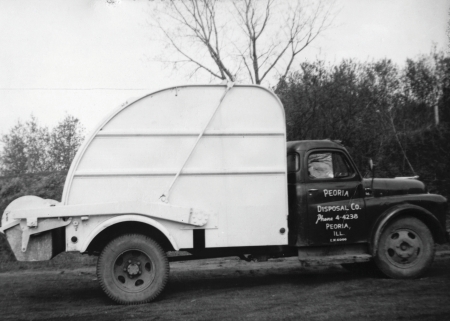 Did you always know you’d take part in the family business? Tell us about your early involvement.
Did you always know you’d take part in the family business? Tell us about your early involvement.
I started as a kid doing summer work at PDC in the mid-1950s. I washed trucks and painted containers. We sprayed garbage cans with white-lime salt during the polio epidemic. The lime salt was a heavy-duty disinfectant, and spraying cans with lime salt was an early example of PDC innovation. We were setting ourselves apart from the competition. Nobody else was disinfecting garbage cans like PDC. That helped build our customer base again.
At the dinner table, my father would tell the family I was going to be the president of PDC someday. Dad’s goal in life was teaching me the garbage business. He was a great mentor and teacher, but he was demanding. As a young man, I had to give him reports on changes to routing and equipment needs. He taught me to focus on improving the company’s bottom line. He asked for and received reports on my weekly sales leads. I follow this same formula today. It is one reason we have been in business for almost 90 years.
We won our first garbage collection contract with the City of Peoria in 1965. Some of PDC’s biggest customers during that era: Hiram Walker, Pabst Brewing, Sherex Chemical Company, Bemis Bag and Lonza. We also picked up the garbage at Caterpillar.
Today, I tell my sons and executive leadership team that reporting on your work productivity and activity is important. In turn, reading their reports keeps me informed. The president and CEO needs to be kept abreast of what’s happening at all levels of an organization. These are simple principles to follow. I’ve also made it a point to surround myself with strong leaders. I value independent critical thinking. I want to be challenged, just as I challenge others. That makes a stronger organization.
How did your father’s death impact you and the company?
My dad died unexpectedly in 1979. At the time of his death, there was a partner at PDC, outside of the family, who had a financial background. After dad died, I assumed his ownership stake in the company, but the minority partner and I did not share the same vision for the company’s future. Because of our strong differences, and unbeknownst to me, this partner sold his shares of PDC to a large national firm. Our family was hurt and angry—we would not let the company go without a fight. The heated dispute ended up in court. We won and kept the company. This was a very stressful period for the company and our family, but it made us stronger as a result.
Talk about the company’s continued growth throughout the 1980s and ‘90s, into the 2000s.
In the late 1980s and early 1990s, we bought two landfills. In 1989, we acquired the Clinton Landfill, which helped kicked off our business growth outside of Peoria. We received local siting approval from the DeWitt County Board in 2002 to expand this landfill by over 265 acres. In 1992, we acquired the Pike County Landfill, which has been renamed the Hickory Ridge Landfill. We received local siting approval from the Pike County Board last year to expand this landfill by over 75 acres.
In the mid-‘80s, we started an analytical testing laboratory with one employee. Today it has grown into PDC Labs, with more than 115 employees. We have four laboratories in the Midwest.
In 1989, we bought Area Disposal Service in Lincoln and started using the name “AREA” for any garbage hauling operation we acquired outside of Peoria. My goal was to grow AREA and make it bigger than PDC. This opened up new markets for the company.
In 2001, we received approval from the Illinois EPA and the Tazewell County Board to re-open the Indian Creek Landfill. We received local siting approval in 2007 to expand this landfill by over 100 acres.
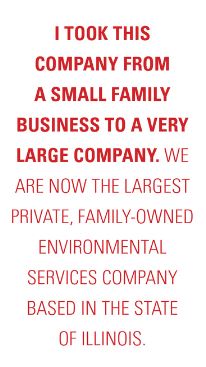 In 2004, I was inducted into the Environmental Industry Association Hall of Fame during Waste Expo in Dallas, Texas—the largest annual environmental services trade show in North America. There are less than 100 members in the Hall of Fame. Folks like Wayne Huizenga and Dean Buntrock (founders of Waste Management) are also members, so I was deeply honored to be inducted with such a noteworthy group of individuals.
In 2004, I was inducted into the Environmental Industry Association Hall of Fame during Waste Expo in Dallas, Texas—the largest annual environmental services trade show in North America. There are less than 100 members in the Hall of Fame. Folks like Wayne Huizenga and Dean Buntrock (founders of Waste Management) are also members, so I was deeply honored to be inducted with such a noteworthy group of individuals.
In 2009, the City and County of Peoria awarded PDC the contract to site, permit, develop and operate the Peoria City/County Landfill No. 3 Facility, which will include the first-ever Household Hazardous Waste Collection Center in downstate Illinois. These new facilities are scheduled to open in 2022 for the public’s use.
In 2010, Doug Oberhelman was appointed president and CEO of Caterpillar. He kicked off his first Administrative Council meeting at the Clinton Landfill—this was his first executive leadership team meeting. CAT group presidents and vice presidents from around the globe came to the Clinton Landfill, which at the time, had the largest earthmoving project underway in the State of Illinois. There were more than 50 pieces of CAT’s heavy equipment in use during the project. During the meeting, the CAT executives were able to see their products in action, up close. It was a proud day for our family business.
In March of 2012, we christened the new Compressed Natural Gas (CNG) public filling station at the PDC trucking terminal on Swords Avenue. T. Boone Pickens helped us open the new facility. Most of our waste collection fleet has converted over to using CNG, which burns cleaner than diesel and is better for the environment. Today, I have a thank-you letter from T. Boone framed in our corporate conference room. He calls his visit to Peoria “a trip to remember.”
In February of 2014, I was inducted in the Peoria Junior Achievement Hall of Fame. I’m a proud local kid who treasures such distinguished recognition.
In December of 2015, we acquired Midland Davis in Pekin. This recycling processing plant made us a fully integrated solid waste service company. AREA Recycling processes 1,600 tons of recycling material each month.
In 2017, we moved our payroll and human resources departments into a renovated building next door to PDC’s corporate office on Sterling Avenue. The remodeled office building was a former gas station, and the dilapidated property had been a vacant eyesore for years. PDC renovated the building to mirror our corporate office. I’m proud to be reinvesting in the Peoria community. PDC’s corporate campus is centrally located at the intersection of three major thoroughfares: War Memorial Drive, Sterling Avenue and Glen Avenue.
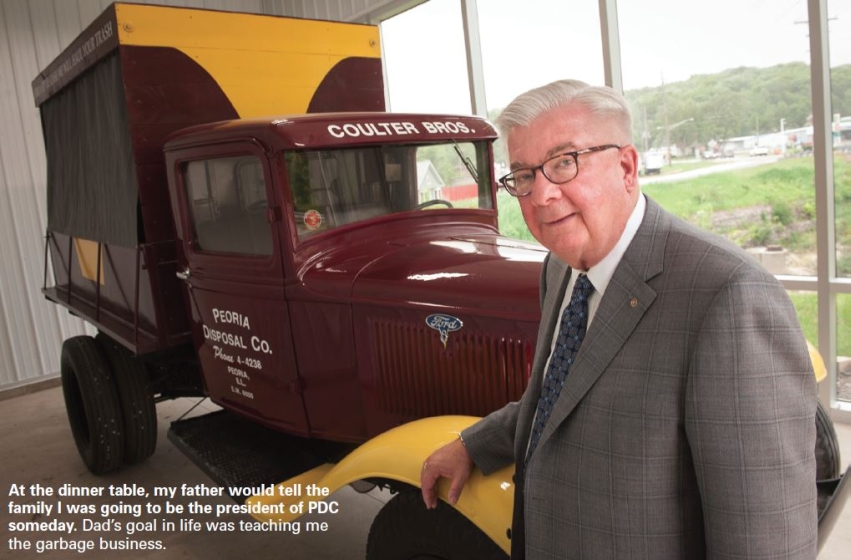 How have your recent acquisitions impacted the company? What synergies or economies of scale have you seen?
How have your recent acquisitions impacted the company? What synergies or economies of scale have you seen?
Since I became president, PDC has acquired more than 70 companies. We have been focused on growth since the early 1980s. We are financially strong. My reputation is that of a tough business leader. I feel confident in my evaluation of any given situation. That is based on a life of hard knocks and experience. That is who I am.
PDC’s employee turnover rate is relatively low. I feel like our salary structure, insurance benefits and profit-sharing program help keep people in place. It is comforting to see the same faces year after year at the office. The employees tell me the same. They like seeing me at work.
I’ve focused on building a more diverse company. Today, we have four landfills, three transfer stations, two waste treatment plants, four laboratories, a recycling processing plant, and an engineering company with technical expertise on landfill design and operation. We also have a fleet of more than 300 trucks. Around 600 people work for the company. In 2017, PDC is ranked as one of the Top 25 largest environmental services companies in North America.
Is it rare to have remained a privately held company in your industry?
Yes. Being a family-owned company is a challenge, but our diversified group of companies has provided us staying power. We pick up and haul solid waste. We recycle when we can. We maintain state-of-the-art landfills and laboratories.
This company is part of my DNA. I’m always trying to find ways to keep our employees motivated and engaged at work. When a national company acquires a business, the first thing they usually do is get rid of the president. The creative driver simply goes away. In my opinion, the entrepreneurial spirit is diminished when a national company takes over a local organization. Because we are family-owned, I think we have an advantage competing against national organizations to buy another garbage hauler wanting to sell.
Do you see a ceiling for the company’s future growth or continued expansion?
No, but we will always have a cautious and conservative approach when we see an opportunity to expand. There are many factors to consider when acquiring another company. The acquisition needs to make strategic and financial sense. It is also a good idea to keep your banker aware of acquisitions. In addition to internal management support, I value and utilize external business relationships. I have always appreciated insight from auditors, bankers, lawyers, consultants and other industry leaders.
As an entrepreneur, you have to be a critical thinker. Growth means spending money. And if we don’t spend our money wisely and in the right places, the company loses, and so do the employees.
I maintain relationships with privately-owned competitors. I want to be at the top of their list if they decide it is time to exit the garbage business. If they want to sell, we look each other in the eye when negotiating the acquisition of their family-owned business. Speaking to the president and CEO gives the owner a piece of mind and comfort knowing his employees will be cared for. I make a promise and keep it. The value of my “word” is important to me.
Was there ever a time when you were worried about the sustainability of the company?
Stressed and terrified—that’s how I felt when we ran out of money in the early 1980s. I simply spent too much, and we came close to closing. We asked all our employees to take a 10-percent pay cut to get us through this period. They did, and kept coming to work. For many months, we went through tough financial times, but PDC survived and the employees stayed loyal. I ultimately paid them back in full, with interest.
The hard part was going in front of my workers and telling them what I did wrong. I promised to see them through this difficult time. The early 1980s were difficult for all of Peoria. I learned you can’t rely on one big project to sustain cash flow. It taught me to recognize limitations and be more in tune with the different markets we operate in. I learned about business cycles and began improving PDC’s long-term financial planning.
Because of that very difficult period, I take a lot more time trying to focus on the future. I trust my gut instincts and the lessons learned from the setbacks I’ve experienced. Understanding failure pays dividends. I try to look way ahead on projects now. If they are good for the company, I push them over the goal line when they may stall otherwise.
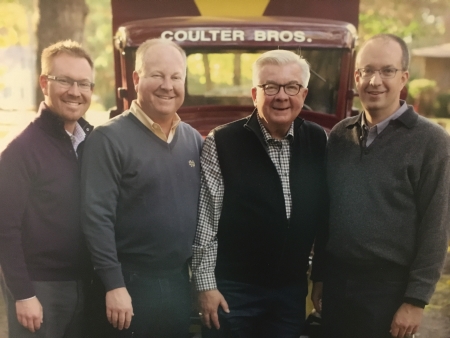
Royal Coulter with sons Matt, Chris and Jeff
Tell us how your sons came into the business, and the roles they now play.
All three sons came into the business at different times. Although they come from the same family, they have very different personalities and strengths.
Chris is my oldest. He has a law degree and deep understanding of technical elements in the solid waste industry. Chris runs our landfills, laboratories and engineering company. A landfill is a highly-regulated operation, with strict government oversight. He knows the intricacies of the landfill and lab business. He oversees the sales and marketing of these services. Chris also spends an immense amount of time with local and state lawmakers, nurturing those political relationships. Government and politics play an important role in the solid waste industry.
Jeff is my second oldest. He grew up on the operational side of the business. While the waste industry is not entirely unique, garbage trucks are expensive, and he understands the importance of having the right piece of equipment for the right job. He understands the cost to run the hauling business and stays up to date on the latest industry technology. Today, he’s pushing for more automated equipment, which makes solid waste collection more efficient, increases the career span of employees and reduces injuries. Jeff sets goals for his managers and focuses on finding efficiencies. His job is protecting the bottom line.
Matt is our youngest. He leads the PDC/AREA solid waste sales team and is the lead negotiator for most acquisition opportunities. Matt likes to think outside of the box. He takes new ideas to customers. He has an MBA from Bradley University. He’s comfortable in front of a crowd and excels at promoting the PDC/AREA brand. Matt is gifted at making our employees feel appreciated. As we grow, it becomes more and more difficult to have a personal relationship with each and every employee. Matt spearheaded a company newsletter, which keeps us tied together to maintain a small company feel.
I’m blessed to have three sons with diverse talents. It reminds me of the days when my dad and his two brothers ran PDC. They didn’t always see eye to eye, but needed each other to succeed. My sons keep each other in the loop on what they’re working on at the company. One son always has to sell the other two on projects they pursue. Challenging each other and playing the devil’s advocate during group decision making is a critical component to success. In 2016, my three sons became company shareholders.
The unspoken leader of our sons is their mother. Kathy makes us think through major decisions in a more thoughtful manner. She is the glue, keeping us together and on track. She also reminds us when it is time to leave business behind and focus on family.
What causes or organizations have been near and dear to you over the years?
For many years, I was an officer in the Illinois Solid Waste Association. After my father’s passing, this organization of private haulers was very supportive to me and my family. I could talk business with them and built many friendships. Those relationships are what led to acquiring Area Disposal and building our business outside of Peoria. Today, I’m an active member in the national Independent Haulers Association and the National Waste & Recycling Association.
Locally, I’ve been involved in and supported many organizations: Boys Scouts of America, Community Foundation of Central Illinois, CEO Roundtable, Concordia Lutheran School Board, Junior Achievement, Salvation Army Tree of Lights Campaign, Easter Seals Foundation Board of Trustees and Telethon VIP, Bradley University Scholarship Society and the Bradley Basketball Chiefs Club. I’m an Advisory Board member for Commerce Bank. It’s important to give back to your community. Our family does a lot to help the Peoria community.
What are your hobbies or interests outside of work?
Kathy and I enjoy traveling together. We love spending time in Jackson, Wyoming, visiting national parks, especially Yellowstone. Most of all, we cherish spending time with our family. We are blessed with 10 grandchildren. They keep us busy on the weekends attending school events and sporting activities. This past Thanksgiving, our entire family spent a week together at Disney World in Florida. There are 18 of us. We had a great time!
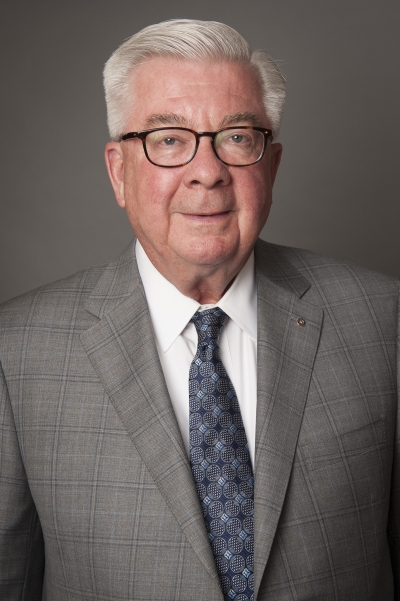 What is one thing most people do not know about you?
What is one thing most people do not know about you?
I’m a walker. Every day at work, I make it a priority to get in at least a mile and a half. Our office is right next door to Northwoods Mall. No matter the weather, I can get in a good half-hour walk. Because my father died of a heart attack at such a young age, personal health is an important part of our company. We have had a wellness program for the last decade. Three years ago, we put in a workout center in the basement of our corporate office.
Photography is one of my passions. Every two or three years, we rent a helicopter and fly over each company operation in our portfolio to take photos and video. The appearance of each facility is important to me. By setting the bar high visually, we maintain our status as a leader in the solid waste industry.
I have been a longtime member of Trinity Lutheran Church in Peoria. Kathy is a member of St. Mary’s Catholic Church in Kickapoo. We enjoy going to Sunday services together. When our grandchildren are in programs in their schools and churches, we go to those events as well.
Do you plan to retire, and if so, what are your plans for your retirement years?
I plan to work as long as my health allows. I truly enjoy going into the office every day. Making decisions—the right decisions—is fun to me. Interacting with our employees is important as well.
I am still learning the importance of a balanced work and home life. While still motivated by work, I am setting more time aside for traveling and time away from the office with Kathy.
Have you thought much about the legacy you wish to leave?
I took this company from a small family business to a very large company. We are now the largest private, family-owned environmental services company based in the state of Illinois. We have an outstanding environmental compliance track record. We have a technical engineering company that has developed and added value to the properties we own. Those are all achievements that make me proud. I want our employees to know they have brought value to me and the PDC companies.
Anything else you’d like to add?
I’d like to be around for 2028 and celebrate PDC’s 100th anniversary. I will be 81 years old. What a thrill to be able to witness the fifth generation of Coulters possibly come to work at PDC! I want to be around for that milestone, a century after John Coulter started PDC with one truck.
The same tools my grandfather, father and mother taught me are still effective today in running a company. I’m confident the same entrepreneurial spirit that started this company will be driving its success 100 years later. Never undervalue integrity, honesty and loyalty. Those values are part of our mission statement and the real fabric at PDC. iBi

